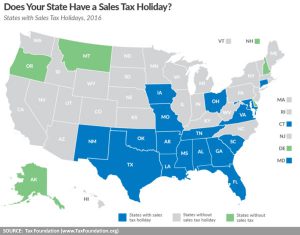
By Andy Brack, editor and publisher | Pens, pencils and paper. Blankets, bed spreads and shower curtains. Adult diapers, bonnets, bridal gowns, corsets, costumes, earmuffs, ice skates, ski boots and tuxedos.
All are among the 100-plus exempt items that can be purchased Aug. 5-7 without paying the 6 percent state sales tax during South Carolina’s 17th sales tax holiday. Consumers will save an estimated $2.25 million in the state tax plus any local sales tax that may apply.
 That’s all well and good, but it’s nothing but a feel-good gimmick, a three-day legislative tax boondoggle to make you feel like you’re getting a real break. We might be able to understand and justify a very limited tax break on school supplies and computers for kids heading back to school. But tax savings for bridal gowns and corsets? Something’s wrong with that — and there’s a name for it: Bad, lazy tax policy.
That’s all well and good, but it’s nothing but a feel-good gimmick, a three-day legislative tax boondoggle to make you feel like you’re getting a real break. We might be able to understand and justify a very limited tax break on school supplies and computers for kids heading back to school. But tax savings for bridal gowns and corsets? Something’s wrong with that — and there’s a name for it: Bad, lazy tax policy.
Seventeen states, most of them in the South, have sales tax holidays, generally related to when parents are getting their kids ready to return to school. Politicians tout sales tax holidays as help for low-income consumers and a way to improve retail sales, promote economic growth and create jobs.
Hooey. Do you really think cutting sales taxes on some items for three days a year is going to actually create new jobs? What about the other 362 days a year? Will all of that “savings” be enough to boost the economy significantly? Nope. All that will happen is that existing employees will work harder and owners will pocket any impact they realize from extra sales.
 “Despite their political popularity, sales tax holidays are based on poor tax policy and distract policymakers and taxpayers from real, permanent and economically beneficial tax reform,” according to a new report by the nonprofit Tax Foundation. “Sales tax holidays introduce unjustifiable government distortions into the economy without providing any significant boost to the economy.”
“Despite their political popularity, sales tax holidays are based on poor tax policy and distract policymakers and taxpayers from real, permanent and economically beneficial tax reform,” according to a new report by the nonprofit Tax Foundation. “Sales tax holidays introduce unjustifiable government distortions into the economy without providing any significant boost to the economy.”
In other words, they don’t make financial sense.
In fact, rather than promoting growth, as often touted by supporters, sales tax holidays often just shift the timing of when a consumer buys something. If you’re thinking about buying a computer, for example, you wait until the sales tax holiday weekend to buy it. You had already decided to buy the computer. You’re just buying it at a different time. The sales tax holiday had nothing to do with encouraging a new sale. A New York study showed that these kinds of timed purchases actually hurt businesses in other times of the year because it slowed down sales in weeks prior and following the tax holidays.
Other problems with sales tax holidays:
They discriminate against products. Some things are exempt, like shawls. Other things routinely used in schools, such as cell phones and briefcases, are not. Furthermore, there’s nothing in the law that keeps store owners from raising prices during sales tax holidays — so that they make more profit, even though you don’t pay the tax. It might be less expensive, for example, to get pen and paper the weekend after the holiday when sales are lower because stores have to offer sales to get people into emptier stores packed just a few days before.
Tax holidays can be confusing. They require a lot of public relations to explain and promote. They create complexity and instability in tax policy, which is best when it is simple. Businesses have to reprogram registers and absorb costs to train workers about the three-day holiday.
The timing can work against you. What if you’re not in the state next weekend? Your neighbor gets the tax break; you don’t. From a policy perspective, “there is little economic justification,” the Tax Foundation argues, “for why a product purchased during one time period should be tax-exempt while the same product purchased in another time period should be taxable.”
Bottom line: If the state really wants to do something to help consumers with their taxes, it should reform the state’s entire tax code and stop giving away billions of dollars in sales tax exemptions to special interests, instead of trying to buy off consumers into thinking they’re getting a real deal for three days.
Have a comment? Send to: editor@charlestoncurrents.com



 We Can Do Better, South Carolina!
We Can Do Better, South Carolina!

























2 Comments